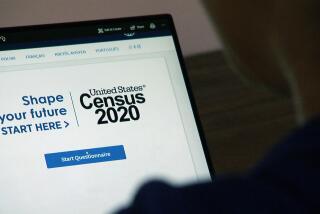Have Times Changed Since ‘89? Russia Asks
- Share via
MOSCOW — Inquisitive state agents began checking up on millions of Russians rich and poor Wednesday. But, unlike in the past, there was no cause for alarm. It was just the 10-year census--three years behind schedule due to lack of funds.
The national head count is the first across Russia’s vast territory since 1989, and economists, politicians and advertisers are eager to fill in the gaps in their knowledge of what has changed for Russia and Russians since the 1991 collapse of the Soviet Union.
Census organizers mounting the $180-million project have gone to extra lengths to convince members of the public that there is no need to fear the data collectors and that no information gained will be used against them. Even so, polls have shown that 5% to 15% of the population is wary about cooperating.
In part to allay the fears, the census bureau has hired mostly clean-cut college students to fill out its three-page questionnaire. And, in a public relations coup, one not-so-typical Moscow suburbanite was shown on television going painlessly through the 10-minute process.
“What is your occupation?” the interviewer asked.
“President of the Russian Federation,” Vladimir V. Putin replied.
Nature of profession? “I render services to the people.”
Oh yes, and he does speak Russian (as well as German).
In the last census, 146 million Russians were counted. This time, statisticians believe the population may have fallen below 144 million because immigrants from other former Soviet republics have not offset a high mortality rate, low birth rate and the emigration of many Russians to Western countries.
But no one knows for sure. And that is why Irina Medvedeva and Andrei Klyukin, both 19-year-old students at Moscow State Technological University, set out Wednesday morning from the city’s Census Station No. 2. The two are part of an army of 600,000 temporary workers being paid less than $16 a week (plus academic credit in some cases) for three weeks of 14-hour days to collect and check data.
Their first stop was a household in a relatively well-to-do apartment building just off Moscow’s Garden Ring, home to three generations of Muscovites. Answering the door, after leashing their Doberman pinscher, were Yelena Romanova, 48, an economist and co-owner of a building company, and her 73-year-old mother, Galina Samilo, a retiree.
“In general, times have changed,” Romanova said. “For us personally, life has gotten better. The last time there was a census, we had not even one car. Now we have two.”
Her mother offered a different view. “Life has changed, but it is complicated to say for the better or not,” Samilo said, standing in their corridor wearing a modish hairstyle and designer T-shirt. “The gap between the rich and poor is much, much greater now. Before, we all lived more or less the same. I think this stratification is not so good.”
But both women said they had no problems answering the interviewers’ questions. “We feel safe. Normal, non-criminal people have nothing to fear,” Romanova said.
Aside from the total number of Russians, the census takers want to find out how the population is distributed across the world’s largest national territory, about the state of housing and standards of living, and about the ethnic makeup.
However, questions on religion were banned--a disappointment to some minority religious groups that believe their sects are more numerous than is widely perceived and deserve more recognition from the state.
Census organizers pledged that names and personal information would be kept private and that only the raw statistics would be tallied. Police and tax collectors were not to be given access to individual questionnaires.
However, unlike in Soviet times, there is no compulsion to answer the questions and no need to provide passports or other documents that support the answers. Everyone is to be taken at their word.
In many cases, census takers do not even need to go door to door because people voluntarily show up at neighborhood offices or other census locations. To urge people to take part, the state statistics committee has mounted a big publicity campaign, with bright, cheerful posters showing a cross-section of Russian citizens.
The dispersal of Russians across their 11 time zones presented some unique problems.
In parts of sparsely settled Siberia, census takers had to travel by boat and on foot. Questions were sent up to the cosmonauts aboard the International Space Station.
And in war-torn Chechnya, the questioning was limited to two days amid heavy security, and only female interviewers were hired because officials believed that strange men approaching could be seen as dangerous.
Local disputes also could play a role. Several women in Vladivostok blockaded their building and said they would not admit census takers until the broken water system was repaired. But Anatoly Petrov, chairman of the Census Commission in Moscow, said such problems were few.
“Today, one could see young people walking in the streets of Moscow, as well as all other cities and towns in Russia, carrying distinct bags on their shoulders. They looked pretty much like schoolchildren who start their school year Sept. 1--the only thing that was missing was flowers,” he said.
“The majority of the people think that the census is an important and useful thing. As a rule, the people who are negative about the census are mostly youths who lack even secondary education.”
*
Alexei V. Kuznetsov of The Times’ Moscow Bureau contributed to this report.
More to Read
Sign up for Essential California
The most important California stories and recommendations in your inbox every morning.
You may occasionally receive promotional content from the Los Angeles Times.













